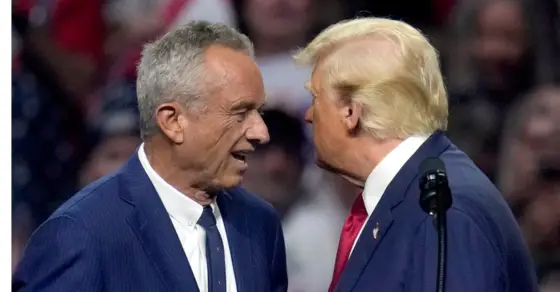Robert F. Kennedy Jr.’s Vision for a Healthier America: Key Promises and Proposed Changes
Robert F. Kennedy Jr., an outspoken advocate for public health and environmental reform, has emerged as a dynamic voice in American politics. Through his platform, “Make America Healthy Again” (MAHA), Kennedy aims to tackle systemic health, environmental, and economic challenges that he believes are eroding the country’s well-being. His approach intertwines public health, economic reform, and environmental preservation, promising to shift national priorities toward holistic wellness.
1. Focus on Health Freedom and Medical Autonomy
Kennedy has been vocal about restoring what he calls “health freedom,” advocating for transparency, accountability, and individual choice in healthcare decisions. He criticizes what he perceives as the undue influence of pharmaceutical companies on regulatory agencies and policy-making.
Proposed Changes:
- Reforming the FDA and CDC: Kennedy proposes restructuring these agencies to eliminate conflicts of interest, ensuring that they prioritize public health over corporate profits.
- Enhancing Vaccine Safety: While not anti-vaccine, Kennedy has called for rigorous testing and independent oversight to ensure vaccines meet the highest safety standards.
- Protecting Medical Choice: He advocates for policies that empower individuals and families to make informed decisions about their health without coercion or mandates.
2. Overhauling the Healthcare System
Kennedy argues that the U.S. healthcare system is profit-driven and fails to address the root causes of chronic diseases, which are often linked to lifestyle and environmental factors. His vision emphasizes preventive care and reducing dependence on pharmaceuticals.
Proposed Changes:
- Promoting Preventive Care: Kennedy supports increasing funding for programs that encourage healthy lifestyles, including better nutrition, exercise, and stress management.
- Reducing Chronic Disease Rates: He aims to tackle the alarming rates of obesity, diabetes, and heart disease through public health campaigns and access to healthier food options.
- Affordable Healthcare for All: Kennedy envisions a system that reduces costs by focusing on preventive care and limiting price gouging by pharmaceutical and insurance companies.
3. Environmental Health and Sustainability
As a longtime environmental advocate, Kennedy emphasizes the critical connection between environmental health and human well-being. He believes that polluted air, water, and soil are directly contributing to the country’s health crises.
Proposed Changes:
- Clean Energy Transition: Kennedy supports a rapid shift from fossil fuels to renewable energy sources, aiming to reduce pollution and mitigate climate change’s health impacts.
- Protecting Water Resources: He promises to strengthen regulations that prevent industrial contamination of water supplies and to invest in infrastructure to deliver clean water to all Americans.
- Eliminating Harmful Chemicals: Kennedy advocates banning hazardous substances like glyphosate and PFAS (forever chemicals) from agriculture and consumer products.
4. Agricultural Reform for Better Nutrition
Kennedy believes that America’s food system is broken, contributing to poor health outcomes and environmental degradation. He proposes a comprehensive overhaul of agricultural policies to prioritize regenerative farming and healthier food production.
Proposed Changes:
- Regenerative Farming Practices: He advocates for incentives to farmers who adopt sustainable practices, which can restore soil health and reduce dependence on chemical fertilizers and pesticides.
- Reducing Processed Foods: Kennedy aims to curb the dominance of ultra-processed foods by encouraging fresh, whole-food diets through education and subsidies.
- Food Label Transparency: He supports stricter labeling laws to inform consumers about additives, GMOs, and nutritional content.
5. Empowering Communities Through Decentralization
Kennedy’s MAHA platform also emphasizes empowering local communities to take charge of their health and resources. He argues that federal overreach often stifles innovation and local solutions.
Proposed Changes:
- Decentralizing Health Policies: Allow states and communities greater flexibility to design healthcare and public health initiatives that cater to their unique needs.
- Supporting Local Economies: Encourage local food production, renewable energy projects, and small businesses to build resilient communities.
- Investing in Public Spaces: Kennedy envisions revitalizing parks, community centers, and recreational areas to promote physical activity and social cohesion.
6. Addressing Mental Health and Substance Abuse
Kennedy sees mental health as an often-overlooked component of public health. He also links the rise in substance abuse to systemic failures, including the over-prescription of opioids and economic despair.
Proposed Changes:
- Expanding Mental Health Services: Increase funding for accessible mental health care and integrate mental health into primary care services.
- Fighting the Opioid Epidemic: Hold pharmaceutical companies accountable for their role in the crisis while expanding access to addiction treatment and prevention programs.
- Reducing Social Isolation: Promote community-based programs that reduce loneliness and foster stronger social connections.
7. Advocating for Economic Health as Public Health
Kennedy argues that economic inequality is a significant driver of poor health outcomes, with lower-income communities suffering disproportionately from preventable diseases.
Proposed Changes:
- Raising the Minimum Wage: Ensure that all Americans can afford basic necessities, including nutritious food and healthcare.
- Addressing Housing Inequality: Expand affordable housing initiatives to reduce the stress and instability associated with high housing costs.
- Investing in Education: Strengthen public education to equip future generations with the knowledge and skills to lead healthier lives.
8. Restoring Trust in Public Institutions
Kennedy acknowledges that distrust in government and public health institutions has grown, partially due to perceived corruption and lack of transparency. He believes restoring this trust is essential for improving public health.
Proposed Changes:
- Improving Government Transparency: Mandate open records and public access to information about health and environmental policies.
- Promoting Civic Engagement: Encourage citizen participation in decision-making processes through town halls and advisory boards.
- Independent Oversight Committees: Establish non-partisan committees to monitor government agencies and ensure they serve the public interest.
Conclusion: A Vision for Holistic Health
Robert F. Kennedy Jr.’s “Make America Healthy Again” platform is more than a campaign slogan; it’s a comprehensive strategy aimed at addressing the interconnected challenges of public health, environmental sustainability, and economic justice. By prioritizing preventive care, environmental stewardship, and community empowerment, Kennedy seeks to reshape America’s approach to health and well-being.
While his proposals face criticism and debate, they have sparked a much-needed conversation about what it means to be a truly healthy nation. Whether or not his vision becomes reality, his platform underscores the urgent need for systemic change to secure a healthier future for all Americans.




